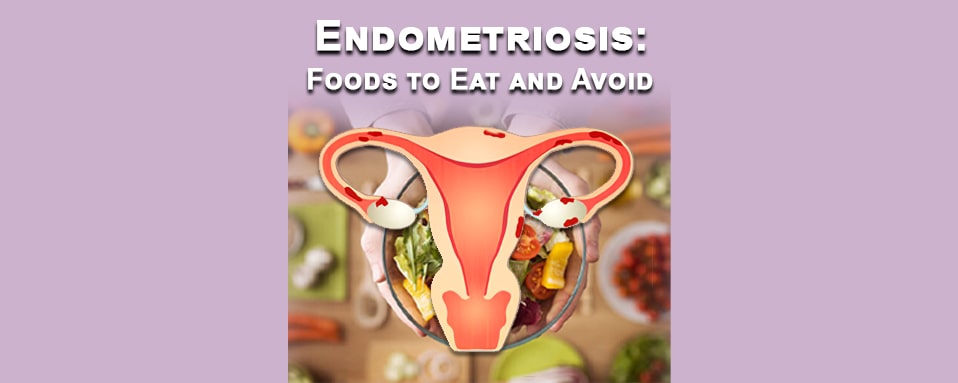Endometriosis: foods to eat and avoid, herbs and Ayurvedic treatment
When we do not feel well and take medication, it may also become necessary to avoid certain foods as they can contribute to the symptoms or the problem. And there are foods that can contribute to the recovery process. Also in endometriosis, some foods can be helpful, while some others can also be harmful.
What is endometriosis?
Endometriosis is a medical condition, in which endometrial-like tissues take place outside the uterus. The growths of these tissues can disturb the functioning of the reproductive system. These tissues act like the endometrial tissues, and also break and bleed during menstruation. Blood from them may remain trapped in the organs and cause inflammation or infection.
Endometriosis causes infertility in women. They can have trouble getting pregnant. Endometriosis, in severe cases, can cause much harm to the reproductive system including the ovaries, the fallopian tubes and the uterus. If left untreated, the symptoms can worsen with time. If the damage is serious and not repairable, the doctor can suggest a hysterectomy, which means a surgical procedure to remove the uterus.
(Read More – Effectively treat blocked fallopian tubes with Dr Chanchal Sharma)
Endometriosis symptoms
All women do not have the same symptoms. Symptoms vary as per the condition of the patients. Some of the symptoms are:
- Spotting between menstruation cycles
- The sexual experience feels painful
- Infertility
- Painful urination (especially during periods)
- Painful bowel movements (especially during periods)
- Intestinal pain
- Pain during periods
- Pelvic pain
- Bloating, constipation, nausea, or diarrhea
- Chronic pain in the lower abdomen
- Heavy periods (more bleeding)
The common sites where endometriosis grows:
- The ovaries
- The fallopian tubes
- In the space between the uterus and the rectum
- In the space between the uterus and the bladder
- The outer lining of the womb
- Tissues that line the pelvic cavity
Some rare sites are:
- The intestines
- The bladder
- The cervix
- The rectum
- The vagina
- The vulva
- The abdomen area
Foods to eat and avoid in endometriosis
It is said that high estrogen and inflammation can make the endometriosis symptoms worse. Food can also help the body reduce inflammation and maintain good estrogen levels.
Foods to eat (endometriosis diet)
- Foods with fiber. It is said that excessive estrogen can aggravate endometriosis symptoms such as pain and cramping. And fiber can help the body get rid of excess estrogen in the stool. Fiber normalizes bowel movements and plays a good role in keeping the digestive system healthy.
If the digestive system does not function properly, it could cause problems such as hormonal imbalance, blood pressure problems or abnormal blood sugar levels.
- Fats to fight inflammation. Women with endometriosis experience inflammation. It is said that Omega-3 fatty acids can have soothing effects on inflammation. Good sources of Omega-3 fatty acids are
- Fatty fish, for example, tuna and sardines
- Seeds and nuts such as chia seeds, walnuts and flaxseeds
- Plant oil, for example, canola oil and flaxseed oil
- Monounsaturated fats—found in, olive oil, peanut butter, avocadoes, nuts and seeds and safflower oil—could also have soothing effects on inflammation.
- Antioxidant-rich foods. An antioxidant-rich diet can also reduce the risk of many diseases including cancer and heart diseases.
- Iron-rich foods. Heavy bleeding is one of the symptoms of endometriosis. Due to this, the body may lose more blood; so, it is important to supply the body the foods that are rich in iron, minerals, vitamins and other nutrients.
Foods that should be avoided
Certain foods or drinks are harmful for the body. They can increase inflammation or hormonal imbalance. They can even reduce the effectiveness of treatment; and therefore, patients should avoid them.
- Caffeine. Caffeine can cause dehydration, constipation, upset stomach and reduce hunger. A higher intake of caffeine can even cause insomnia, nervousness, irritation and depression. Therefore, one must avoid or reduce taking it.
- Alcohol. Alcohol could also worsen the symptoms.
- Processed foods. The preservatives in processed foods might increase inflammation. Many processed foods have less nutritional value as compared to fresh ones.
- Sugary drinks. Consuming too much sugar might aggravate the risk of obesity, heart diseases, inflammation and high blood pressure.
- Red meat. It is said that red meat might increase estrogen levels. But the treatment aims to bring the estrogen levels down. So, eating too much red meat might cause trouble.
(Read More – Endometriosis and pregnancy in Hindi)
Herbs that can help endometriosis treatment
Certain herbs and natural ways can help treat the symptoms of endometriosis. Such as,
- Chamomile. It is said that chamomile has the ability to suppress and destroy endometrial cells.
- Pink bark. Pink bark might reduce endometriosis pain, when consumed alongside oral contraceptives.
- Ashwagandha. It is said to be helpful in reducing stress and bringing cortisol levels down.
- Curcumin. It is said to have anti-inflammatory effects. As it is an active ingredient in turmeric, it can have a good impact on hormones and blood.
- Some natural ways may include
- Pelvic massage
- Heat with hot water bags
- Yoga/ light exercise
- Herbal supplement
- Haritaki herb
- Sonamukhi herb
Endometriosis in Ayurveda
Ayurveda talks in terms of three doshas kapha, vata and pitta. Ayurveda explains that endometriosis could be the result of disturbed vata dosha.
Ayurvedic doctors treat endometriosis by using effective natural medicines and various therapies. Ayurvedic treatment, besides the treatment, helps keep the body healthy and increase fertility by making a balance between doshas. Some of the therapies are:
- Uttar basti
- Pizchill
- Basti karma
- Swedana
- Virechan
- Udvartana
- Abhyanga
Endometriosis Ayurvedic doctor in Delhi
Consult Doctor Chanchal Sharma, an endometriosis specialist in Delhi
Aasha Ayurveda Center
Contact number: +91- 9811773770, Website: www.aashaayurveda.com


